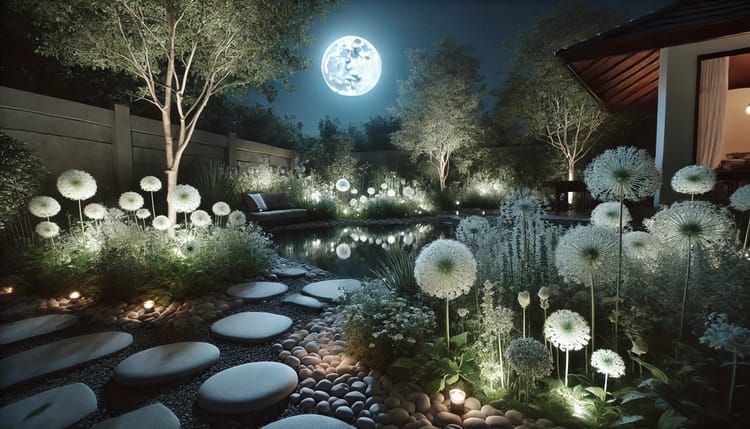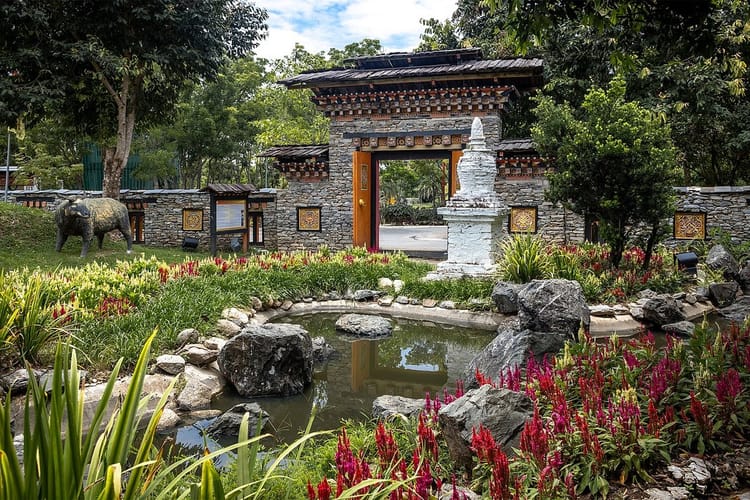The Art of Feng Shui in Your Garden: A Harmonious Oasis

A well-tended garden is not just a space for horticultural expression; it is a canvas where the principles of Feng Shui can be applied to create harmony, balance, and positive energy. Originating from ancient Chinese philosophy, Feng Shui (pronounced "fung shway") is the art of arranging elements in our environment to promote well-being and harmony. In today's post, we will delve into the fascinating world of Feng Shui for the garden, where every plant, stone, and pathway plays a vital role in creating a peaceful and balanced outdoor space.
The Basics of Feng Shui
Before diving into the specific techniques and applications of Feng Shui in your garden, it's crucial to understand the core principles that underpin this ancient practice:
Chi Energy
At the heart of Feng Shui lies the concept of chi (or qi) energy, which represents the life force that flows through all living things. In the garden, chi energy should flow freely and gently, nourishing both the plants and the people who interact with the space.
Yin and Yang
Balance is key in Feng Shui, and the interplay of yin (passive, soft) and yang (active, strong) energies should be carefully considered. A harmonious garden should strike a balance between these opposing forces.
Five Elements
Feng Shui categorizes elements into five fundamental categories: Wood, Fire, Earth, Metal, and Water. These elements interact and influence each other, and their presence in the garden can significantly impact the overall energy.
Layout and Design
Now that we have a grasp of the fundamental principles, let's explore how you can incorporate them into the layout and design of your garden.
Flow of Chi
Begin by assessing the flow of chi energy in your garden. Ensure that pathways are clear and unobstructed to allow chi to meander gently through the space. Avoid sharp angles or straight lines, as these can disrupt the natural flow of energy. Curved pathways and garden beds are preferred.
Yin and Yang Balance
Balance yin and yang elements in your garden. For example, if you have a vibrant, yang-oriented flower bed, balance it with a calm, yin element like a tranquil pond or a seating area with soft cushions.
Five Elements
Incorporate the five elements strategically. For instance, you can represent Wood with wooden furniture or a trellis covered in vines, Fire with bright, fiery-colored flowers, Earth with stone pathways or sculptures, Metal with metal garden art, and Water with a pond, fountain, or a small water feature.
Plant Selection and Placement
Choose the Right Plants
Feng Shui advocates selecting plants that are appropriate for your climate and the specific needs of your garden. Healthy, vibrant plants symbolize vitality and prosperity. Avoid overgrown or dying plants, as they can bring negative energy.
Color Coordination
Colors play a significant role in Feng Shui. Each color corresponds to one of the five elements, and their arrangement can impact the energy of your garden. For example, red and orange represent Fire, green symbolizes Wood, yellow and brown relate to Earth, white and metallic hues represent Metal, and blue and black are associated with Water. Balance these colors in your garden for harmony.
Tree Placement
Trees are essential in garden Feng Shui. They provide shade, support wildlife, and represent growth. Plant trees strategically to protect your home from strong winds and create a sense of security. Avoid planting trees too close to your home, as their shadow can block light and disrupt energy flow.
Garden Features and Accessories
Enhance the Feng Shui of your garden with carefully chosen features and accessories.
Water Features
Water is a potent symbol of wealth and abundance in Feng Shui. Incorporate a water feature, such as a pond or fountain, in your garden to invite prosperity. Ensure the water flows gently, and the sound is soothing rather than overpowering.
Garden Statues and Art
Garden sculptures and statues can represent various elements or symbols of significance. Ensure that they are well-maintained and positioned with intention. A laughing Buddha statue, for example, can bring joy and positive energy.
Seating Areas
Create comfortable seating areas where you can relax and enjoy your garden. Use soft cushions, throws, and inviting furniture to promote relaxation and encourage positive chi flow.
Maintenance and Care
Maintaining the Feng Shui of your garden is an ongoing process.
Regular Pruning
Keep your plants well-groomed and pruned. Overgrown or unruly plants can disrupt the energy flow in your garden.
Clean Water Features
Ensure that water features are kept clean and free from debris. Stagnant or dirty water can bring negative energy.
Weed Control
Regularly remove weeds from your garden, as they symbolize stagnation and chaos.
Repair and Replace
Repair or replace broken garden elements promptly. A damaged or deteriorating feature can introduce negative energy into the space.
Special Considerations
Bagua Map
The Bagua map is a Feng Shui tool that divides your garden into nine sectors, each representing a different aspect of life (e.g., wealth, health, love). By aligning specific elements and colors with each sector, you can enhance these areas of your life.
Compass Directions
Consult a compass to determine the orientation of your garden. Each direction corresponds to an element (e.g., north to Water, south to Fire). Use this information to balance the elements within your garden.
Feng Shui is a powerful practice that can transform your garden into a harmonious oasis. By understanding the principles of chi energy, yin and yang balance, and the five elements, you can create a garden that not only delights the senses but also promotes positive energy and well-being. Remember that Feng Shui is a highly personalized practice, and your garden should reflect your unique preferences and intentions. Whether you have a sprawling backyard or a cozy urban balcony, the principles of Feng Shui can be adapted to create a peaceful and balanced outdoor space that nurtures your mind, body, and spirit. Embrace the art of Feng Shui in your garden and watch as it flourishes with beauty, vitality, and positive energy.





